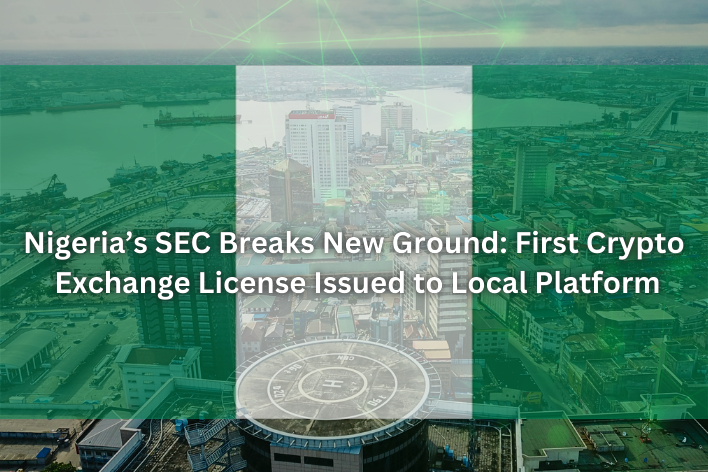Nigeria’s SEC Breaks New Ground: First Crypto Exchange License Issued to Local Platform
Introduction:
In a groundbreaking move that could reshape Nigeria’s financial ecosystem, the Nigerian Securities and Exchange Commission (SEC) has granted its first provisional operating license to Quidax, an Africa-based cryptocurrency exchange. This historic decision marks a pivotal regulatory milestone, signaling the beginning of formal recognition and oversight within Nigeria’s dynamic digital asset industry. As the largest economy in Africa and a global leader in cryptocurrency adoption, Nigeria's entry into regulated crypto trading is a significant step toward fostering a more secure, transparent, and investor-friendly environment. This development not only underscores the importance of regulatory frameworks in the crypto space but also positions Nigeria as a key player in the global digital economy, attracting both local and international investors to its burgeoning market.
Regulatory Milestone:
Quidax’s co-founder and CEO, Buchi Okoro, expressed deep appreciation for the SEC’s decisive action, particularly under the forward-thinking leadership of Emomotimi Agama. This regulatory approval is a significant achievement for Quidax, as it marks the first time a local crypto exchange has received such formal recognition from Nigeria’s top financial authority. Beyond being a mere regulatory milestone, this license instills a new level of confidence in the Nigerian crypto ecosystem, signaling that the market is maturing and ready for broader institutional participation. With this provisional license in hand, Quidax is now empowered to forge strategic partnerships with banks and other financial institutions, opening the door to enhanced financial services that integrate both traditional and digital currencies. This development not only solidifies Quidax’s position as a trailblazer in the Nigerian crypto market but also sets a crucial precedent for other local exchanges, encouraging them to strive for regulatory compliance and ultimately contribute to a more secure and robust digital asset environment in the country.
Regulatory Framework:
The SEC’s decision to grant Quidax a provisional operating license comes on the heels of a significant overhaul of its regulatory framework, underscoring the Nigerian government’s commitment to establishing a well-structured digital asset ecosystem. On June 21, the SEC introduced comprehensive amendments to its rules, encompassing digital asset issuance, offering platforms, exchanges, and custody services. This updated regulatory environment aims to bring greater clarity and oversight to the rapidly growing crypto industry in Nigeria. A key component of this regulatory shift is the Accelerated Regulatory Incubation Programme, specifically designed to help virtual asset service providers, like Quidax, align with the new standards. This program serves as a bridge for businesses to transition smoothly into compliance, ensuring they meet the stringent requirements necessary to operate within Nigeria’s formal financial system. The SEC’s proactive approach in establishing these guidelines not only facilitates the growth of the digital asset market but also enhances investor protection and market integrity, setting the stage for a more resilient and trustworthy crypto industry in Nigeria.
Challenges and Requirements:
While the SEC’s regulatory advancements represent a positive step forward for Nigeria’s crypto industry, they also come with significant challenges that could reshape the market landscape. One of the most pressing concerns is the stringent licensing requirements that exchanges must meet to operate legally. These include a minimum upfront capital requirement of 500 million naira (approximately $556,620) and a Fidelity Insurance Bond that covers at least 25% of the stipulated minimum paid-up capital. For many emerging and smaller exchanges, these financial thresholds present a substantial barrier to entry, potentially limiting the number of local players in the market. This could lead to a more consolidated industry, where only well-capitalized firms like Quidax can afford to meet these rigorous standards. While these measures are designed to enhance market integrity and investor protection, they also raise questions about the accessibility and inclusivity of the regulatory framework, particularly for startups and smaller enterprises aiming to innovate within Nigeria’s rapidly growing digital asset space.
Impact on Nigeria’s Crypto Landscape:
Nigeria, Africa’s largest economy, has long been a global leader in cryptocurrency adoption, consistently ranking among the top countries worldwide. According to the 2023 Cryptocurrency Geography Report by Chainalysis, Nigeria holds the second position in crypto adoption among 154 nations, highlighting its critical role in the global digital asset ecosystem. Despite this widespread adoption, the expected influx of foreign crypto investment has yet to fully materialize, largely due to concerns over regulatory uncertainty. The introduction of a formal regulatory framework, exemplified by Quidax’s recent licensing, could be a game-changer for the Nigerian crypto landscape. By providing a clear and structured path for exchanges to operate legally, the SEC’s actions may foster greater confidence among both local and international investors. This newfound regulatory clarity could attract the foreign investment that Nigeria’s crypto market has been waiting for, potentially transforming the country into a more secure and appealing destination for digital asset ventures.
Conclusion:
As Nigeria's regulatory environment continues to evolve, Quidax’s successful acquisition of the SEC’s first provisional operating license sets a significant precedent for the country’s digital asset industry. This development is likely just the beginning, as other local exchanges will likely follow in Quidax’s footsteps, striving to meet the SEC’s stringent requirements. The formal recognition and oversight provided by this regulatory framework signal a new era for Nigeria’s burgeoning crypto market, one that promises increased stability, investor protection, and the potential for substantial growth. As more exchanges gain approval and the market matures, Nigeria is poised to solidify its position as a leading hub for cryptocurrency in Africa and beyond, attracting both local and global players to its increasingly secure and regulated digital asset ecosystem.





